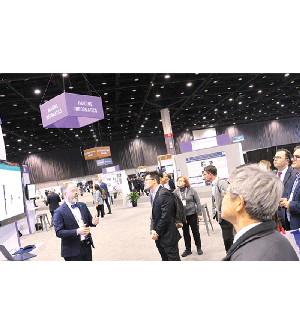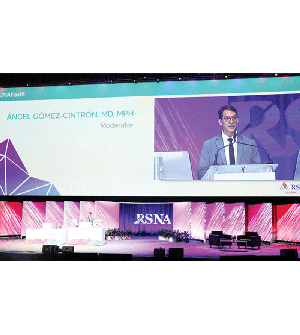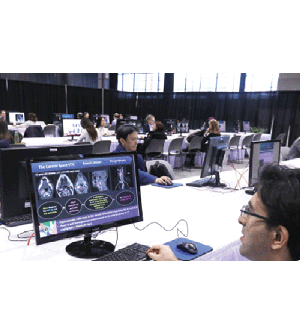RSNA 2024 Education and Science Session Highlights
RSNA 2024 offers 300+ educational courses and scientific sessions

RSNA 2024 offers 300+ educational courses and scientific sessions covering every subspecialty in a variety of formats across all career levels. Here is a sampling of session highlights and education and science courses you might want to include in your meeting agenda for the week.
Science Sessions
Each one-hour science session includes a series of seven-minute presentations of hypothesis-driven research focused on a common theme. Science sessions cover every subspecialty and modality. Science sessions with keynote include an introduction and/or conclusion to the topic by an invited lecturer.
Educational Courses
Invited faculty teach courses across all subspecialties in sessions that last one to two hours. Presentations take on several different formats. Browse the online program and filter by subspecialty and
content format to find the course that fits your needs.
Case-based courses offer case scenarios to demonstrate best practices and include self-assessment for participants to test their knowledge. Consider these courses:
• Is it a Tumor? Case Based Review of Common Mimics in the Brain, Spine, Head and Neck
• What Cardiac Device is That? Interactive Session on Imaging Heart Failure Patients
• Cased-based Review of PET/CT: Infection/Inflammation and Gastrointestinal Malignancies
Essentials courses are designed for the general radiologist, trainees and subspecialty radiologists who want to review other areas of focus. Faculty focus on the fundamentals of the given topic. Consider these courses:
• Pediatric Neuroimaging: You Don’t Want to Miss This!
• It’s a Full Moon: A Nightmare on Night Float, Trauma Cases
• Cardiac Imaging in Private Practice: Maximizing Efficiency with Quality
Hot topics courses highlight late-breaking research and innovations in radiology and offer a variety of viewpoints on a topic. Consider these courses:
• Telemammography: Success Stories, Tools for Troubleshooting and Embracing Innovation
• Zooming In-Fast MRI Imaging: Imaging with the Wiggles
• Hot Topics in 2024 Emergency Radiology
Interactive sessions invite audience participation using technology including polling, self-assessment or gamification. Consider these sessions:
• Cardiac CT Mentored Case Review: Coronary Atherosclerotic Disease: From Straightforward to Most Complicated
• Musculoskeletal Interventions – Fixation and Augmentation Procedures
• GU Cased-Based Audience Participation Session: Fundamentals
RSNA Labs
RSNA Hands-On Labs are seven 90-120 minute sessions where you can learn about and practice a variety of imaging and interventional protocols across several modalities and various body structures.Practice techniques in the RSNA Hands-on Labs with hands-on training courses focused on Pediatric Musculoskeletal US; Liver Elastography; US Doppler Hands-On Course of the Carotid System and Abdominal Vasculature; Musculoskeletal US Workshop: Ankle and Foot; Breast US Biopsy; MRI-Guided Breast Biopsy; and Contrast Reaction Management.
The RSNA Deep Learning Lab, located in the Learning Center, will feature 14 unique sessions covering a range of topics and skills. Bring your own devices for hands-on activities and to explore new tools and resources.
RSNA Deep Learning Lab sessions are available in several skill levels including beginner-friendly options. See topics and schedules on Meeting Central and add labs to your registration. A registration fee is required for all lab sessions.
Special Sessions
NIH Grantsmanship WorkshopSunday, Dec. 1, 12 p.m.
This workshop introduces participants to the process of preparing a competitive research or training grant application. Designed for junior faculty in academic centers who wish to pursue a career in radiologic research, this didactic workshop will cover elements of a good grant proposal, understanding the review process and planning the proposal. Workshop attendees must be registered for the RSNA annual meeting.

Fast 5
Monday, Dec. 2, 4 p.m.Five speakers present for five minutes each in these fast-paced presentations. The innovative, non-clinical topics were selected by popular vote. Follow the conversation on social media at #RSNAFast5.
Moderator: Ángel Gómez-Cintrón, MD, MPH
Tessa S. Cook, MD, PhD
Mentors, Sponsors and Coaches: The People We Need in Our Professional Lives
Abhinav Suri, BA, MPH
An Opportunity for Opportunistic Screening
Niraj Nirmal Pandey, MBBS
Fixing Responsibility When AI Fails!
Lauren Rachel Kriger Groner, DO, MS
Leveraging Community-Engaged Research Principles to Bridge Gaps between Communities, Healthcare, and Technology and Advance Health Equity
Robyn Gartner Roth, MD
Stepping Out of the Darkroom & Into the Spotlight: How to Use Social Media to Educate & Advocate
Case of the Day
Each day a unique and challenging case is available online for meeting participants to submit answers. The correct answer is revealed the following morning. Answers must be submitted by midnight CT on the day the case is available online. Participants who submit the correct answer receive 0.5 AMA PRA Category 1 Credits™.
Record of Attendance, Certificates and Earning Credit
RSNA designates this activity for CME Credit. The total number of approved CME Credits can be found in the meeting’s program information. Physicians should claim only the credit commensurate with the extent of their participation in the activity.
The RSNA 2024 Evaluation and Credit site is designed for self-service. All registrants, except for ARRT, can review credit and adjust credit for education sessions attended, complete session evaluations, and print and save credit certificates or records of attendance at any time.
Virtual Access registrants can maintain extended access beyond the week of the live meeting until April 30, 2025, at noon CT, to view sessions and earn additional on-demand credits. After April 30, 2025, no further revisions to transcripts will be allowed; however, attendees can access the credit claiming site through April 30, 2025, to print their CME certificate or Record of Attendance.
This year RSNA has made a change to the ‘Add a Session’ feature on the Evaluation & Credit Site. We understand that not everyone who attends a session in person is able to have their badge scanned to record their attendance. Due to that fact, participants can access the Evaluation & Credit Site and add the sessions they were unable to scan into simply by searching for and adding that session. However, this feature will only be available for up to two weeks after the onsite meeting ends (December 20, 2024).
To have a session added after December 20, you must select a session and play the video recording. That will trigger the system to automatically add the session to your credit record. RSNA 2024 will offer A+/A ARRT credit. To record and obtain A+/A continuing education (CE) credits, all ARRT-registered radiologic technologists and radiologist assistants must follow ARRT guidelines:
• Be present for 50 minutes for every scheduled hour of approved ARRT CE sessions
• Scan in and scan out with their badge from approved ARRT CE sessions after meeting the 50-minute requirement
• Evaluate their 2024 RSNA AART courses online at RSNA.org/MeetingCentral.
Please note that there will be no ARRT credit for attending virtual or on-demand sessions. RSNA 2024 does not offer SelfAssessment Modules (SAMs). Members are encouraged to visit RSNA’s Online Learning Center for opportunities to complete SACME credit throughout the year.
For More Information
Register to attend RSNA 2024.
Learn more about the RSNA 2024 plenary lineup
Access the RSNA 2024 Session Catalog.
See who is exhibiting at RSNA 2024.
Check out the RSNA 2024 social and networking events.